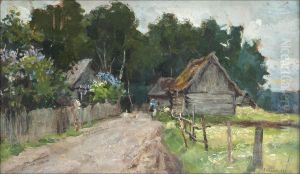Abraham Arkhipov Efimovitch Paintings
Abraham Efimovich Arkhipov was a distinguished Russian realist painter and member of the Peredvizhniki (Wanderers), a group of Russian realist artists who formed an artists' cooperative in protest of academic restrictions. His work is known for its empathetic portrayal of the lives of the Russian peasantry and working class.
Arkhipov was born on August 27 (O.S. August 15), 1862, in the village of Yegorovo in the Ryazan region of Russia. From a young age, he developed a keen interest in art, and this led him to pursue formal education in the field. In 1877, he enrolled in the Moscow School of Painting, Sculpture, and Architecture, where he studied under renowned artists such as Vasily Perov and Alexei Savrasov.
Arkhipov's work was heavily influenced by his teachers and the social atmosphere of Russia during the late 19th century. He was particularly moved by the plight of the Russian peasantry, which became a central theme in his paintings. His empathetic approach to his subjects allowed viewers to feel the hardship and toil of peasant life.
After graduating from the Moscow School, Arkhipov attended the Imperial Academy of Arts in St. Petersburg. He traveled across Russia, drawing inspiration from the diverse landscapes and people. His travels and experiences enriched his work, providing a depth of understanding and compassion that was evident in his paintings.
Arkhipov became a member of the Peredvizhniki in the 1890s, which allowed him to exhibit his works across Russia. His most famous works from this period include 'The Washerwomen' and 'The Peasant Women of Ryazan'. These paintings showcased his ability to use color, light, and composition to evoke the strenuous labor and harsh conditions faced by working women.
During the early 20th century, Arkhipov also served as a professor at the Moscow School of Painting, Sculpture, and Architecture, where he had once been a student. He influenced a new generation of Russian artists, sharing his passion for realism and social commentary.
Abraham Efimovich Arkhipov continued to paint until his death on September 25, 1930. His legacy is preserved in his powerful portrayals of the Russian working class, which remain significant in the history of Russian art for their contribution to the understanding of social issues through the medium of painting.
